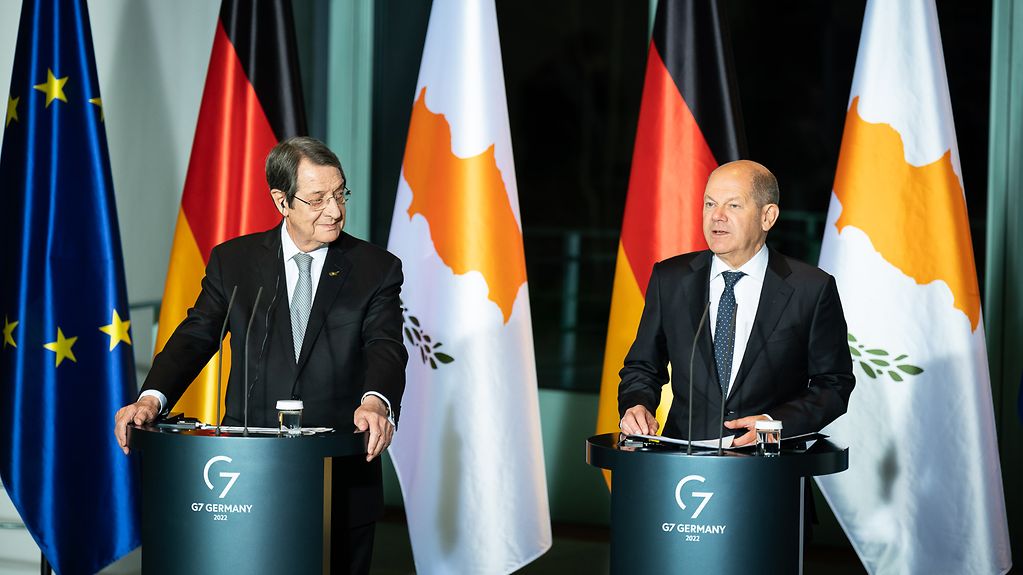Federal Chancellor Scholz receives the President of Cyprus
As members of the European Union, Germany and Cyprus are united in highlighting to Russia the political and economic consequences of its war. This was the message from Federal Chancellor Scholz when he met President Anastasiadis of Cyprus. He called on Putin to end the senseless killing.

Federal Chancellor Scholz and President Anastasiadis of Cyprus – a close relationship in challenging times.
Photo: Federal Government/Kugler
Germany and Cyprus are linked by a close bilateral partnership as well as through the European Union. Following his talks with President Nikos Anastasiadis of Cyprus in the Chancellery on Wednesday, Federal Chancellor Olaf Scholz stressed that the meeting in Berlin had again made it clear to him “how close, diverse and trusting our relationship is.”
The Federal Chancellor added that Europe was facing major challenges this winter due to Russia’s invasion of Ukraine. “It is not only unacceptable, but also a blatant violation of international law that Russia has been carrying out a targeted bombardment of civilian infrastructure for weeks now. This terror bombing of the civilian population must end immediately!” was Scholz’s clear demand, and he stressed that this action showed once again the ruthlessness and relentlessness of the Russian dictator Putin in his conduct of the war against Ukraine. Scholz went on, “This is a war that he can no longer win on the battlefield – that much is clear.”
The Federal Chancellor calls for an end to the killing
For this reason, the Federal Chancellor again appealed to Putin saying, “End this senseless killing. Withdraw your troops completely from Ukraine, and agree to peace talks with Ukraine.”
The Federal Chancellor reiterated that, as members of the European Union, Germany and Cyprus were united in highlighting to Russia the political and economic consequences of its war. To this end, Scholz went on, the EU had imposed unprecedented sanctions and repeatedly tightened them since the beginning of Russia’s war of aggression. As the Federal Chancellor stressed: “We will maintain the pressure of sanctions on Russia.”
Scholz also pledged to make every effort to support Ukraine: “In view of the most recent destruction in particular, we must now invest in repairing and maintaining the energy infrastructure as a high priority.”
Solving the Cyprus question through dialogue
The discussion also covered the Cyprus question. Federal Chancellor Scholz explained that Germany expressly supported a bi-zonal and bi-communal solution, which was supported by resolutions passed by the United Nations.
The Federal Chancellor reaffirmed that the Federal Government was willing to mediate in the Cyprus conflict. “I would like to see the deadlocked negotiation process on the Cyprus question gain momentum again. Germany stands ready to support the negotiation process led by the United Nations if so desired,” Scholz said.
Relations with Turkey relevant to Europe as a whole
The two leaders discussed the situation in the eastern Mediterranean. Scholz said that this maritime area had considerable economic potential and there were good opportunities for regional cooperation on energy. “That’s why it is in the interests of all in the region to cultivate good neighbourly relations around the Mediterranean.”
The Federal Chancellor said he had formed the impression that Cyprus was ready to play its part. He also hoped sincerely that all others involved would commit themselves as well.
“The relationship between Cyprus and Turkey is relevant for Europe as a whole. I am convinced that questions that arise in the eastern Mediterranean can be solved through dialogue and on the basis of international law.”
Close bilateral connections
On the topic of bilateral relations, Scholz said the two leaders had pledged to further expand cooperation in many areas, including energy and climate issues. This also applied to cooperating on questions around migration, the Federal Chancellor said.